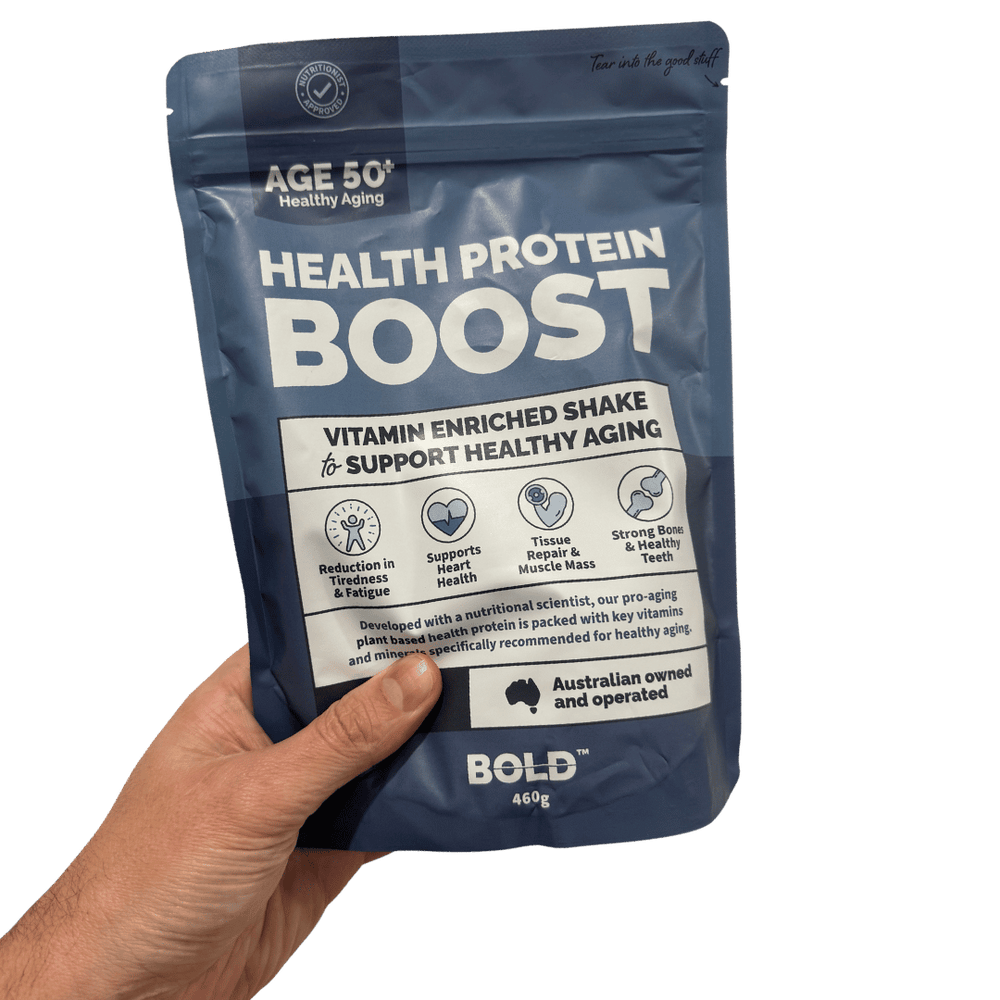The New Science on Protein: What Five Years of Research Revealed About Aging well
Why Protein Matters Even More After 50: What the Latest Science Reveals
By nutritionist Louise Fisher
When I reached my 50s, I was the fittest I’d been in years, raising busy teenagers, training in the evenings, and sometimes skipping meals when life got too hectic. Despite staying active, I kept catching every cold and virus going around.
I now realise it may have been a sign I was low in protein. Other clues include slow-healing scratches or noticing that opening jars or lifting groceries feels harder than it used to.
If you’re over 50, increasing your protein intake is one of the quickest, most effective ways to support energy, strength, and resilience. It’s an essential pro-ageing nutrient, one that science is increasingly showing we’re not getting enough of.
4 Key takeaways
🧠 1. The Science Has Moved On
Five years of new global research show that Australia’s 2006 protein guidelines are out of date — most experts now recommend higher intakes for adults over 50
💪 2. You Need More Protein Than You Think
To stay strong and maintain muscle after 50, aim for 1.0–1.2 g of protein per kg of body weight daily, and up to 1.5 g/kg if you’re active or recovering from illness.
🔬 3. Ageing Bodies Use Protein Less Efficiently
As we age, our muscles become less responsive to protein — meaning we need more to get the same benefits we once did. Regular resistance exercise boosts those results.
🌿 4. Small Daily Changes Make a Big Difference
Spread your protein across meals, include a good source at breakfast, refuel after exercise, and choose lean or plant-based proteins for long-term strength and vitality.
Now we can deep dive into the research with 4 power tips to age well ⬇️
Global Research Points to Higher Protein Needs
Over the past five years, I’ve reviewed the world’s leading studies and recommendations on protein and ageing, from Europe, the United States, Canada, and Japan. The picture is remarkably consistent: older adults need more protein than current Australian guidelines suggest.
Australia’s official protein recommendations were last updated in 2006, using evidence that’s now more than two decades old. The NHMRC’s current Recommended Daily Intakes (RDIs) suggest 0.84 g/kg for men aged 31–70 and 1.07 g/kg for men 70+, and 0.75 g/kg for women aged 31–70 and 0.94 g/kg for women 70+.
However, more recent international research shows that these numbers are too low to maintain muscle, immunity, and independence as we age. Most experts now recommend at least 1.0 – 1.2 g/kg of body weight daily, with higher targets (up to 1.5 g/kg) for those recovering from illness or engaging in resistance training.
For example, a 70 kg woman should aim for around 70–84 g of protein each day, while a 90 kg man should target 90–108 g.
If you’re doing regular strength or resistance training, add another 20–30 g to support recovery and muscle repair.
Why This Matters After 50
As we get older, our bodies become less efficient at processing and using protein — a phenomenon known as anabolic resistance. This means you need more protein to maintain the same muscle mass you had in your younger years.
Research has found that while men in their 20s can build muscle with about 20 g of protein in a meal, men in their 70s may need double that to see the same effect
Protein isn’t just for muscle, though.
It supports immune health, repairs tissues, regulates hormones like insulin, and even keeps your bones strong. From as early as 30, we begin to lose muscle mass — a process that can accelerate after 50 and contribute to frailty and falls later in life.
The good news? You can build and maintain muscle well into your 90s with enough protein and regular strength training.
My Four Protein Power Tips
-
Make every meal count
Spread your protein intake across the day, aiming for 20–30 g per main meal. Research suggests your body absorbs protein more efficiently this way. -
Don’t skip breakfast
Many people start their day with toast or coffee, missing a key protein opportunity. Try Greek yoghurt with nuts and fruit, a high-protein cereal, or a protein shake if you’re in a rush. -
Refuel after exercise
Add 20–30 g of protein within an hour of finishing exercise to support recovery. Bold Health’s protein powder, designed especially for people over 50, is an easy way to meet these needs and it includes extra pro-ageing nutrients. -
Choose healthy protein sources
Focus on lean meats, chicken, fish, legumes, tofu, nuts, seeds, reduced-fat dairy, and plant-based protein powders. Limit high-saturated-fat meats like bacon or sausages.
The Takeaway
The science has moved on and so should our national nutrition advice. The message from the latest global research is clear: older adults thrive on more protein, not less.
By updating our approach and choosing nutrient-rich, balanced sources of protein, we can stay strong, active, and independent well into later life.



